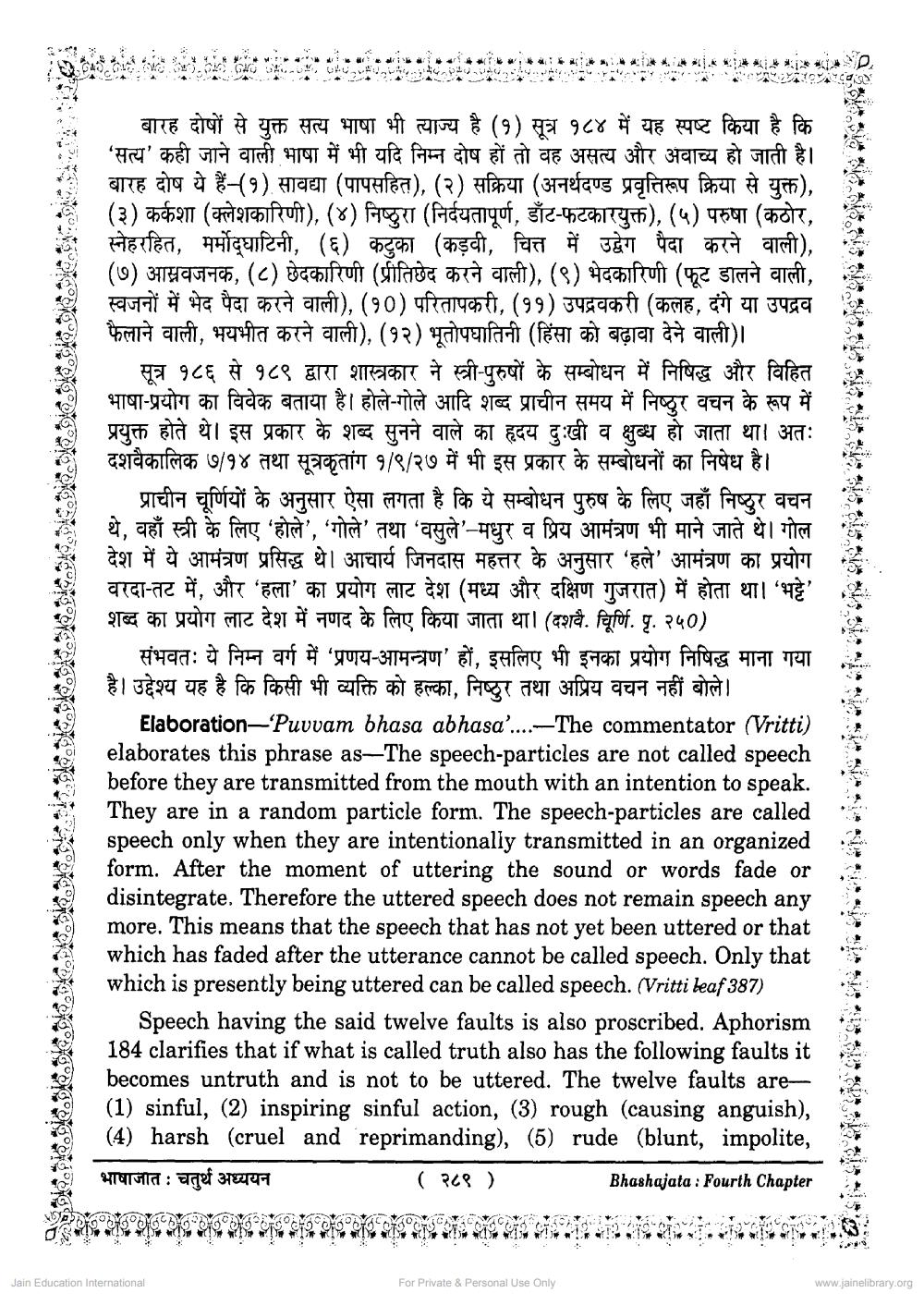________________
ED.GSOCCANCist..GOO.GLAVATAR
AAPaani
i
.viodicarer
बारह दोषों से युक्त सत्य भाषा भी त्याज्य है (१) सूत्र १८४ में यह स्पष्ट किया है कि 'सत्य' कही जाने वाली भाषा में भी यदि निम्न दोष हों तो वह असत्य और अवाच्य हो जाती है। बारह दोष ये हैं-(१) सावद्या (पापसहित), (२) सक्रिया (अनर्थदण्ड प्रवृत्तिरूप क्रिया से युक्त), (३) कर्कशा (क्लेशकारिणी), (४) निष्ठुरा (निर्दयतापूर्ण, डाँट-फटकारयुक्त), (५) परुषा (कठोर, स्नेहरहित, मर्मोद्घाटिनी, (६) कटुका (कड़वी, चित्त में उद्वेग पैदा करने वाली), (७) आसवजनक, (८) छेदकारिणी (प्रीतिछेद करने वाली), (९) भेदकारिणी (फट डालने वाली. स्वजनों में भेद पैदा करने वाली), (१०) परितापकरी, (११) उपद्रवकरी (कलह, दंगे या उपद्रव फैलाने वाली, भयभीत करने वाली), (१२) भूतोपघातिनी (हिंसा को बढ़ावा देने वाली)।
सूत्र १८६ से १८९ द्वारा शास्त्रकार ने स्त्री-पुरुषों के सम्बोधन में निषिद्ध और विहित भाषा-प्रयोग का विवेक बताया है। होले-गोले आदि शब्द प्राचीन समय में निष्ठुर वचन के रूप में प्रयुक्त होते थे। इस प्रकार के शब्द सुनने वाले का हृदय दुःखी व क्षुब्ध हो जाता था। अतः दशवैकालिक ७/१४ तथा सूत्रकृतांग १/९/२७ में भी इस प्रकार के सम्बोधनों का निषेध है।
प्राचीन चूर्णियों के अनुसार ऐसा लगता है कि ये सम्बोधन पुरुष के लिए जहाँ निष्ठुर वचन थे, वहाँ स्त्री के लिए 'होले', 'गोले' तथा 'वसुले'-मधुर व प्रिय आमंत्रण भी माने जाते थे। गोल देश में ये आमंत्रण प्रसिद्ध थे। आचार्य जिनदास महत्तर के अनुसार 'हले' आमंत्रण का प्रयोग वरदा-तट में, और 'हला' का प्रयोग लाट देश (मध्य और दक्षिण गुजरात) में होता था। ‘भट्टे'
शब्द का प्रयोग लाट देश में नणद के लिए किया जाता था। (दशवै. चूिर्णि. पृ. २५०) ____ संभवतः ये निम्न वर्ग में 'प्रणय-आमन्त्रण' हों, इसलिए भी इनका प्रयोग निषिद्ध माना गया
है। उद्देश्य यह है कि किसी भी व्यक्ति को हल्का, निष्ठुर तथा अप्रिय वचन नहीं बोले। ___Elaboration-Puvvam bhasa abhasa'....-The commentator (Vritti)
elaborates this phrase as—The speech-particles are not called speech before they are transmitted from the mouth with an intention to speak. They are in a random particle form. The speech-particles are called speech only when they are intentionally transmitted in an organized form. After the moment of uttering the sound or words fade or disintegrate. Therefore the uttered speech does not remain speech any more. This means that the speech that has not yet been uttered or that which has faded after the utterance cannot be called speech. Only that which is presently being uttered can be called speech. (Vritti beaf 387)
Speech having the said twelve faults is also proscribed. Aphorism 184 clarifies that if what is called truth also has the following faults it becomes untruth and is not to be uttered. The twelve faults are (1) sinful, (2) inspiring sinful action, (3) rough (causing anguish), (4) harsh (cruel and reprimanding), (5) rude (blunt, impolite, भाषाजात : चतुर्थ अध्ययन
( २८९ )
Bhashajata : Fourth Chapter
8
Jain Education International
For Private & Personal Use Only
www.jainelibrary.org




